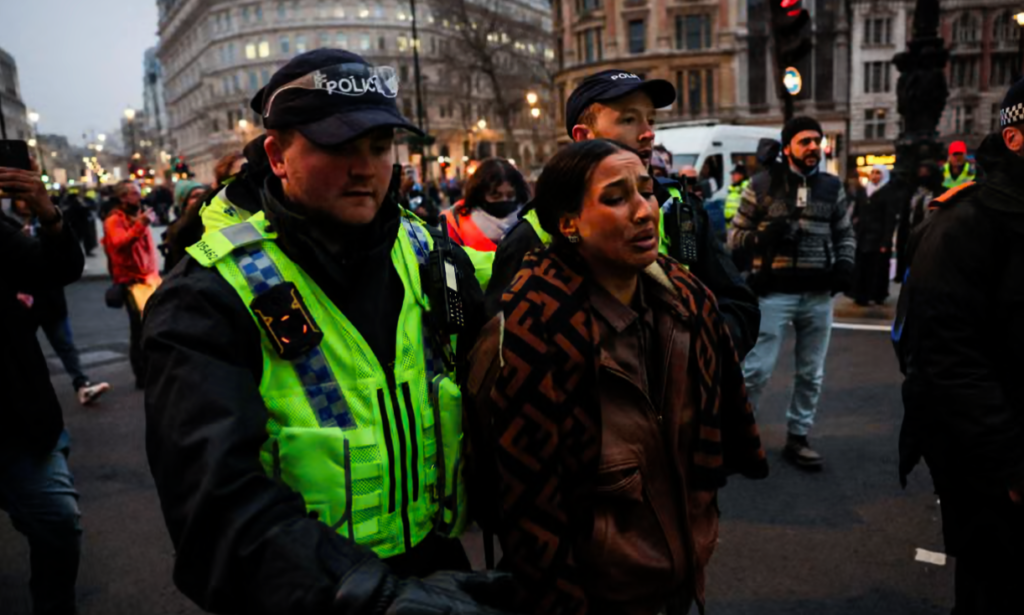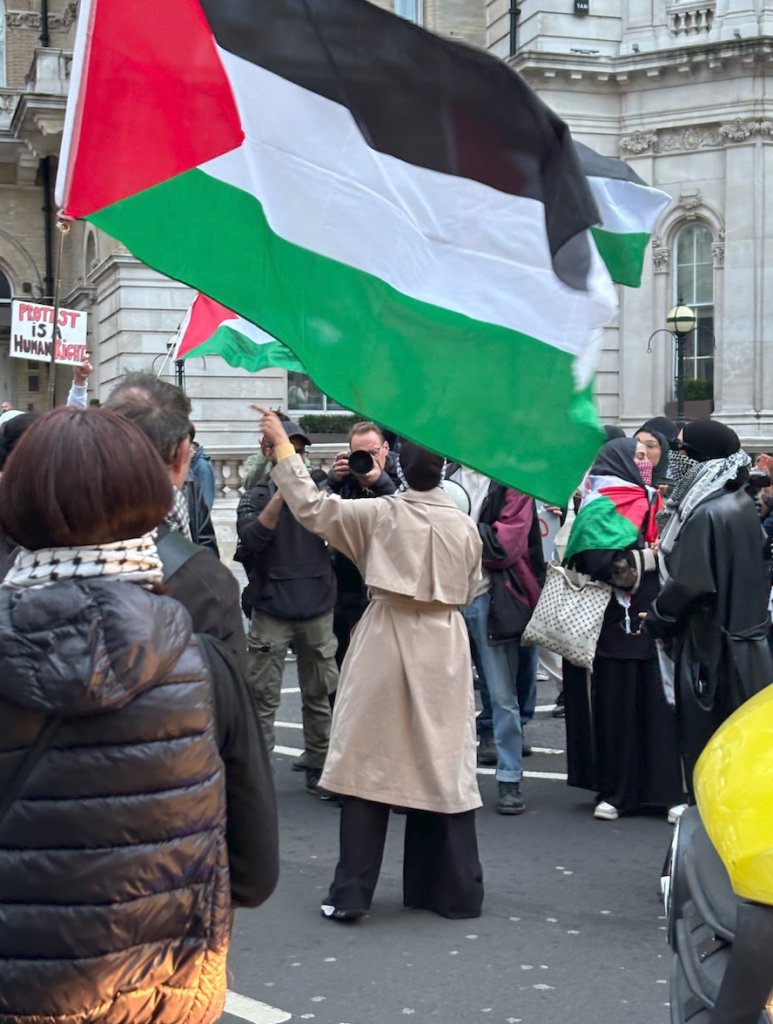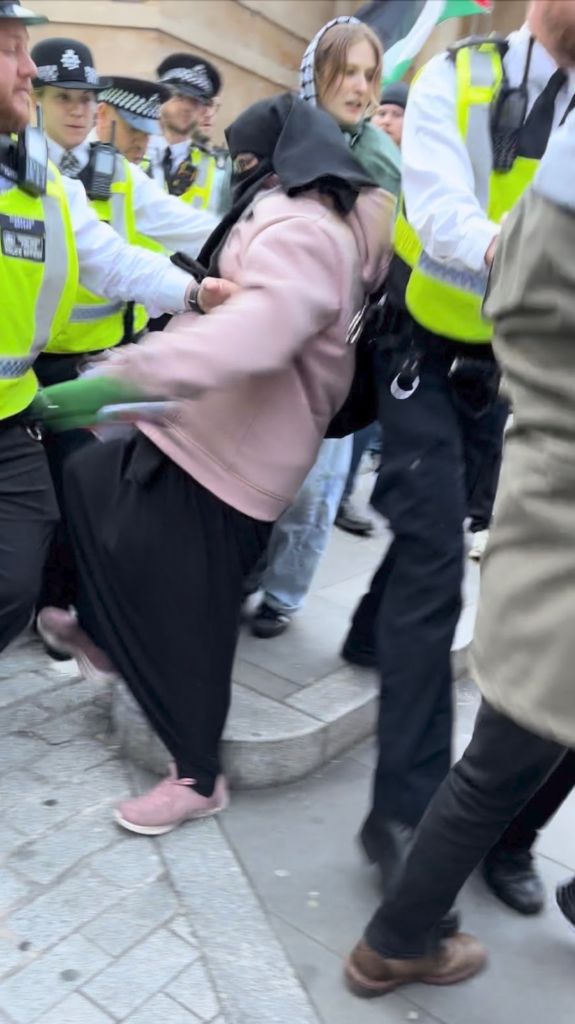A reaction to being kettled and reflection on the authoritarian turn of the British state through policing
It produces a horrible feeling. Animal instincts and feelings swell up as you are trapped in an enclosed space by other animals. They form a tight circle around you and slowly constrict that circle, coming closer to you, narrowing down your spatial and psychological freedom.

Kettling was originally a military practice that would “ideally” end up with the circling soldiers slaughtering or incapacitating the contained people. For obvious reasons police forces sometimes wish to dissociate this tactic from its gruesome military roots, so they might refer to kettling in different terms such as “corralling” or “containment”. This is an example of propaganda.
The man who came up with the theory behind kettling in a policing context, Peter Waddington, was a police officer who became a sociologist. The vocational combination of a police officer-turned-sociologist strikes me as an unhealthy mix of passions (though an academic expert on policing emphasised to me, whilst sharing my concerns, that Waddington did also contribute some serious theoretical work). Waddington wrote the following: “I remain firmly of the view that containment succeeds in restoring order by using boredom as its principle weapon, rather than fear as people flee from on-rushing police wielding batons.”
This is riddled with problems. By propping up kettling in false comparison with ‘on-rushing police wielding batons’, Waddington creates a false dichotomy that forces you to think of one act as violent and the other as a matter of innocuous “boredom”. The dishonest suggestion is that kettling doesn’t evoke fear, only a touch of dullness. Mentioning the visceral, fearful image of brutal, charging police officers makes the reader’s mind anchor any sense of violence around that image. Then the reader discounts or diminishes any violent association surrounding the idea of kettling, thinking, “well, that can’t be that bad then, it’s not like being charged down with a baton”.
Accepting that kettling is a fearful practice, though less so than a baton charge, we are left with the moral question of whether or not it is acceptable for a police force to intentionally trap and scare peacefully protesting citizens. In the instance of kettling that I experienced on 15th April, 2025, our protest was entirely peaceful and we were attacked by the Metropolitan Police outside the BBC headquarters in central London. The entire police approach was unjustified. But, even in the cases when violence at a protest was instigated by protesters, the efficacy of kettling must be questioned.

Waddington pointed to the “success” of kettling on certain occasions. Ethically speaking, this principle might be compared (though drastically different in magnitude, obviously) to the professed “success” of a death sentence in removing a criminal from our society – an act of state violence to prevent further crimes (and/or an act of state revenge). Does the state have the right to kill or kettle its own citizens? Is the British state’s approach to deterrence and retribution moral or effective?
Waddington presents kettling as, in fact, humane — the police’s academically-backed, generous alternative to violence for which we should be grateful. But kettling often ends in police-led violence, arbitrary arrests, non-protesting bystanders being caught up in the trap, and is scary in and of itself.
Waddington reportedly once said at a conference, ‘that he was in favour of the use of CS spray and water cannon as a less violent alternative to the traditional police baton charge, which he saw as of doubtful legality and possibly dangerous.’ Are there no options for more effective and humane police practice than CS spray, water cannon, and baton charging? Is the same attention given to practices of nonviolence, de-escalation, communication, negotiation, and peaceful conflict management?
Kettling is an activity with roots in military slaughter that was brought theoretically into the realm of policing by way of sophistry. It is one thing to try to imagine its justifiable use by the police in response to violence that has already been committed or clearly threatened. It is another thing to see how kettling is justifiable in any other situation, such as that of an entirely peaceful protest. This latter kind of approach to peaceful protests is used far too often by police in the United Kingdom to suppress dissent, especially and increasingly in the context of the movements for Palestinian liberation and the climate.

This is not a sophisticated practice resulting from a feat of visionary thinking – we are talking about surrounding people, constricting them, then attacking them or eventually letting them go. It’s a simple application of a practice from its original context to another. The fact that it might have been intellectually legitimised by the police officer-turned-sociologist is unfortunate, though I imagine this is not widely convincing.
Waddington brought a brutal military method designed to assist in the killing or subduing of a group of people, usually considered a national enemy, to the streets of our own country, where it is now used against our fellow citizens. He himself described certain new methods and technologies as ‘paramilitary’, which is an ethos that British policing is traditionally meant to have eschewed in accordance with Peelian principles.
In this discussion there are the obvious components of fear, intimidation, chilling effects, and violence. But there are components of liberty and rights too. If we believe in habeas corpus, the presumption of innocence, and basic freedoms (to protest and to speak), then we should be against kettling (as it is being used frequently, if not inherently), and against the turn this country is taking towards intolerance of dissent.
As already mentioned, one might see why the police would see the tactic of kettling as justified in specific scenarios (though I don’t agree), such as to contain violence or anticipate potential violence. But this doesn’t address other important issues, for example whether or not kettling is an ethical or effective response, whether or not the police created the tension in the first place, the state’s creation and maintenance of criminogenic conditions, and the existence of a state entity with a legal monopoly on violence and dubious accountability structures.
I spoke with a police officer at a protest outside Downing Street against the Gaza genocide one week after the pre-meditated police attack on us peaceful protesters outside the BBC headquarters. He said that his colleagues must have had a reason to arrest, assault, and behave in the way I described outside the BBC. He was right – the reason was that they had decided to do so beforehand. His response highlighted to me that we are up against the logic of the mainstream, i.e. the putatively reasonable claim that police is something we citizens should be grateful to have protecting us. This belief rests outside of reality.
The police can go to a protest and arrest people randomly (then dearrest them later), physically assault people, film and put people on file with facial recognition technology, and attempt to get people convicted for causing a ‘public nuisance’ (in accordance with the Public Order Act). Then they can excuse their behaviour by saying that they were tipped off by someone, they were preempting a crime (which they can call conspiracy), or simply that they had good reason. There is plentiful research asserting that police officers are often backed up, even in cases of clearly wrongful violence, by the judicial system.

In light of the UK state’s assault on basic freedoms and its genocide against Palestinians, it becomes difficult not to see current police action, such as that against organisations like Youth Demand, Just Stop Oil, and Extinction Rebellion, as an intentional, premeditated, multifaceted crackdown, regardless of any case-by-case justifications conjured up, especially by the police who are more likely to see their own actions as autonomous rather than as an implementation of extraneous political goals.
Successive prime ministers from both major parties – Johnson, Truss, Sunak, and now human rights lawyer Starmer – have all enacted or maintained laws that attack protest and are incompatible with any version of a substantively free society. They have put this country on a dangerous path from which it is difficult to deviate, as political elites often succumb to the temptation to continue repressive measures step by step rather than give up their own powers for the sake of liberty. The following passage is from a piece by Amnesty International:
‘The latest protest measures in the Crime and Policing Bill should be understood in the context of three previous sweeping anti-protest laws: the Police, Crime, Sentencing and Courts Act 2022, the Public Orders Act 2023 and the Serious Disruption Regulations 2023.
Thanks to this authoritarian legislation, police can define almost any demonstration as “seriously disruptive” and impose restrictions on it. Peaceful tactics like locking on, tunnelling and even causing “serious annoyance” have been criminalised. New powers have been created to issue orders banning people from even attending protests.
There has also been a steep rise in the use of facial recognition technology in the policing of protest. This is despite the UK Court of Appeal concluding in 2020 that the legal framework in place at the time for this technology violated human rights.’
The state is scared, desperate, and lashing out to defend its decisions, including its decision to be an active part of a genocide, and its interests (political, financial, etc.). Domestic militarism – the use of violent tactics by the police – to crush dissent should make us think about the society and political system we wish to inhabit. A healthy democracy firstly would not be committing genocide, secondly would not be lying to cover up its genocide, thirdly would not be deploying the police to attack citizens peacefully protesting against its genocide.
This use and abuse of all institutions at hand (media, police, courts) in the most rancid, degrading ways to maintain genocide policy is testament to both the appaling decisions made on an individual basis by political actors as well as the failures and incentives of an inherently flawed system. These concerns are shared by Amnesty International, Human Rights Watch, Liberty (human rights), many other human rights groups, and our parliament’s own Joint Committee on Human Rights.

Authoritarianism is a visibly rising force in this country. I haven’t conducted polling but I imagine that a majority of the British population is unaware of this trend. Most people are not pushing the boundaries of the state’s allowed discourse. Naturally, journalists, activists, politicians, academics, progressives are the ones most keenly aware of this crackdown. A corollary to this is the concern that it is regressive, reactionary forces that will benefit the most — white supremacists, racists, Islamophobes, anti-immigrant bigots, transphobes, homophobes, misogynists, corporates, and high-net-worth individuals will be most protected and served by authoritarian state structures.
This is a trend, not a moment. It will get worse before it gets better. It is imperative that we stick together and look beyond ourselves and towards the broadest community sensibilities we can imagine. We need each other.
Rajiv Sinha is The Director of Hindus for Human Rights UK.
Instagram
X





















